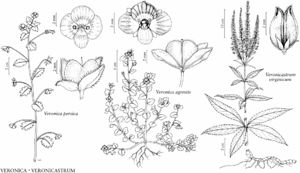Difference between revisions of "Veronicastrum virginicum"
Druggist’s Circ. 61: 231. 1917.
imported>Volume Importer |
imported>Volume Importer |
||
| Line 60: | Line 60: | ||
|publication year=1917 | |publication year=1917 | ||
|special status=Illustrated;Endemic | |special status=Illustrated;Endemic | ||
| − | |source xml=https:// | + | |source xml=https://bitbucket.org/aafc-mbb/fna-data-curation/src/2e0870ddd59836b60bcf96646a41e87ea5a5943a/coarse_grained_fna_xml/V17/V17_779.xml |
|genus=Veronicastrum | |genus=Veronicastrum | ||
|species=Veronicastrum virginicum | |species=Veronicastrum virginicum | ||
Latest revision as of 19:36, 5 November 2020
Stems unbranched or branched distally, 80–200 cm. Leaves: proximal leaves: withering, petiole 2–4 mm, blade lanceolate to broadly lanceolate or elliptic, (40–)70–140 × 10–36 mm; distal leaves: petiole 0.1–3 mm, blade lanceolate to narrowly lanceolate or elliptic, 20–40 × 3–10 mm. Racemes 1–8(–12), continuous, cylindric, 6–35 cm; bracts leaflike, smaller distally, (4–)12–75 × 1–12 mm; cymes 1- or 2-flowered. Pedicels ascending, 0.3–1.2 mm, glabrous; bracteoles linear-lanceolate to linear. Flowers: calyx glabrous, lobes 1.2–3 × 0.5–1 mm, abaxial 2 shorter than abaxial (2 or)3; corolla 4–5.5(–6.5) mm, glabrous externally, obscurely pubescent internally, tube not differentiated from throat, 1–1.3 mm diam., lobes spreading, broadly ovate to triangular, 1.2–2.2 mm, abaxial 3 narrower than adaxial 1; stamens long-exserted, filaments 7–9 mm; nectariferous ring at base of ovary; style 7–9 mm. Capsules ovoid to ellipsoid, 2.5–4.5(–5.2) × 1.8–2.3 mm, glabrous. Seeds 0.3–0.7 × 0.2–0.4 mm. 2n = 34.
Phenology: Flowering Jun–Aug.
Habitat: Dry to mesic forests, tallgrass prairies, thickets, oak savannas.
Elevation: 0–300 m.
Distribution
Man., N.S., Ont., Ala., Ark., Conn., Del., D.C., Fla., Ga., Ill., Ind., Iowa, Kans., Ky., La., Maine, Mass., Mich., Minn., Miss., Mo., Nebr., N.J., N.Y., N.C., N.Dak., Ohio, Okla., Pa., S.C., S.Dak., Tenn., Tex., Vt., Va., W.Va., Wis.
Discussion
The roots and rhizomes of Veronicastrum virginicum were used widely by Native Americans as an emetic and cathartic (D. E. Moerman 1998). The pharmacologic properties of V. virginicum have been studied and promoted since the early 1800s (K. Kindscher 1992). It is grown widely as an ornamental and often escapes from cultivation. Populations in Nova Scotia are introduced.
Selected References
None.
